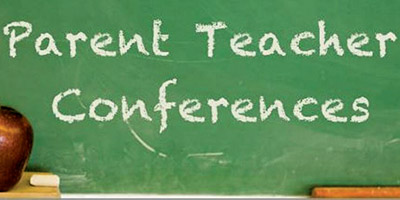
Parent-Teacher Conferences are coming up, or else they happened already. You should really be on the ball about these things. Especially if you’re the teacher. It sends a bad message when a parent doesn’t show up to conferences, but it sends an even worse message if the teacher doesn’t show up.
“What?! I get seven vacation days!”
As a parent, conferences are a rare opportunity to talk to your child’s teacher one on one, unless you bring your spouse. It’s just you, your teacher, your spouse and the guy who comes in to remind you that your time is almost up.
As a teacher, it’s a good time to tell the parents about anything that doesn’t fit into the tiny box on the report card that cannot possibly hold enough words to describe an entire human being.
So as someone who’s been a student, a parent and a high-school teacher, I’ve come up with some tips so that you can make the most of it:
Tips for Teachers:
- Tips for teachers are appreciated. But tips for parents of well-behaved students are also appreciated.
- To start, try to find something positive to say about the kid, even if he’s not great academically. For example, “He always brings good food to class.” “He’s very athletic in class.” “He has a great arm.” Parents are proud of their kids’ strong points. And while you’re talking about this, you can take the time to quickly look up his grade, and also determine genetic traits such as whether the parents are talking while you’re talking, throwing things in the garbage on the other side of the room, asking if they can go to the bathroom for three of the five minutes you’re allotted or breaking out into song.
- Now is the time to give back any Legos you confiscated.
- If the parents say, “Well, he’s probably bored in class,” the implication being that it’s your fault that he isn’t listening when all you do is constantly try to make the lessons more fun and interesting, say, “So he’s never bored at home? That’s awesome! Give me some tips!”
- If you say something less than positive, ask, “Is he like this at home?” (“Yeah, at home he doesn’t hand in worksheets either.”)
- Figure out a good way to ask the parents if they’re the ones doing the homework.
Tips for Parents:
- Now is the time to find out if the teacher really never gives homework on Thursdays, or if your child just doesn’t like doing homework on Thursdays.
- Walk up to random teachers and ask if they’re your child’s teacher. Teachers like to know that parents are involved like that.
- Make sure to ask questions that show that you’re paying attention, such as, “How is my child doing socially?” “How can I help at home?” “How can I help at home if my child dorms?” and “How come you guys call it PTA? What does the A even stand for?” This is a good question, because in most of the world—public schools included—it’s called “parent-teacher conferences,” and PTA stands for “parent-teacher association,” which is like a club, sort of like the Ladies Auxiliary, which makes the shalach manos, organizes the Chinese auction and sells a Pesach cookbook to benefit PS 613 or whatever.
But the A doesn’t have to stand for “association.” It can also stand for: Aggravation, Accords, of America, Anonymous, Adversity, Animosity, Assimilation, Agitation, After hours, Audience, Acrobatics, and Parent-Teacher Acronym. It can also stand for a third party that might be there:
-Parents, Teachers, Almighty
-Parents, Teachers, Attorney
-Parents, Teachers, Advil
- This is also a good time to ask about any concerns you may have, such as how much glue your child eats exactly, and what kind of hechsher it has.
- One thing you might want to do, if the conference is in your child’s classroom, is figure out which desk is his. This way you can know what he’s really doing in class, and you can also get that apple that he’s been saving since Rosh Hashanah. A good way to figure out which seat is your child’s is to look at the covers of the seforim and see what name is in them. If the seforim in a particular desk don’t have covers, that’s probably the right desk.
- Take notes. This will show your teacher that you don’t know why your child doesn’t take notes, but he didn’t get it from you. If your spouse doesn’t want the blame either, you can both sit there taking notes.
- Don’t walk off with the teacher’s pen.
Tips for Students:
- Prepare yourself for a bad report. Clean the house and make supper so your parents are in a better mood when they get home or so they have more time to discipline you.
- But just in case, come up with excuses, such as, “Why are you surprised? You know how bad I am at listening!”
- Don’t leave anything incriminating in your desk, such as tests with low scores, lunches you asked for and didn’t eat and live animals you caught during recess. The last thing you want is for them to fall out on your parents laps during conferences.
By Mordechai Schmutter
Mordechai Schmutter is a freelance writer and a humor columnist for Hamodia, The Jewish Press and Aish.com, among others. He also has five books out and does stand-up comedy. You can contact him at [email protected].













